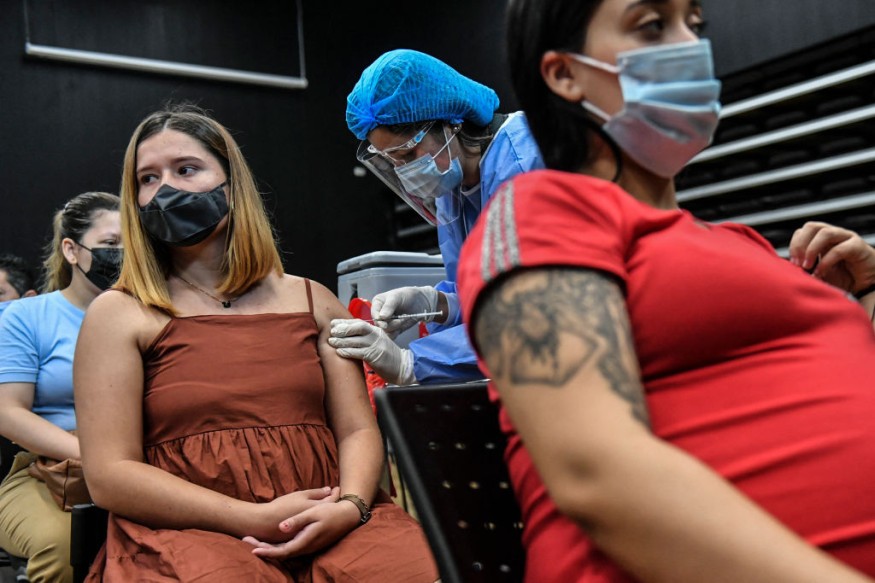Japanese researchers claim that the Omicron COVID-19 variant may live longer on plastic surfaces and human skin than earlier strains of the virus.
A research by a team from Kyoto Prefectural University of Medicine, which has not yet been peer-reviewed (per Euro News), claimed that mutations lived considerably longer than the original strain in a series of laboratory tests.
They came to the conclusion that Omicron's high "environmental stability," or propensity to remain infectious, may have aided it in displacing Delta as the dominant form and spreading more quickly.
Prior to peer review, the researchers published the study, "Severe Outcomes in Residents of Long Term Care Facilities Following Infection With Sars-Cov-2 Omicron Variant (VIVALDI Study)," on medRxiv.

A pregnant woman is inoculated with the Pfizer-BioNTech vaccine against COVID-19 at a vaccination center in Medellin, Colombia on July 24, 2021. - Colombia started to inoculate pregnant women who have three months of pregnancy or more.
Omicron Stays Longer on Surfaces
The research found that the COVID-19 Omicron variant had the highest environmental stability among VOCs. Saudi Gazette said that its high stability might be one of the causes that allowed the Omicron version to replace the Delta variant and spread fast, the scientists stated.
According to the European Centre for Disease Prevention and Control, Omicron is now prevalent in all EU nations. It has become the dominant variety in most member states, continuing to be a serious problem worldwide (ECDC).
Despite being more resistant to ethanol than the original COVID-19 strain, all variations were totally inactivated on the skin after 15 seconds of contact with alcohol-based hand sanitizers.
Finland (99.9 percent), Belgium (99.7 percent), Malta (99.3 percent), and Denmark (99.3%) were the nations with the greatest percentage of new cases attributable to Omicron by sequencing (98.8 percent).
Other COVID-19 Variants Had More Than Survival Rates on Skin, Plastic
Reuters said that the Alpha, Beta, Delta, and Omicron variations had more than two-fold higher survival durations on plastic and skin than the Wuhan strain, and infectivity was sustained for more than 16 hours on skin surfaces.
The original strain, as well as the Alpha, Beta, Gamma, and Delta variations, had average survival periods of 56 hours, 191.3 hours, 156.6 hours, 59.3 hours, and 114 hours on plastic surfaces, respectively.
The researchers said Omicron took 193.5 hours - the equivalent of eight days - to manifest.
The original virus survived for 8.6 hours on cadaver skin samples, 19.6 hours for Alpha, 19.1 hours for Beta, 11 hours for Gamma, 16.8 hours for Delta, and 21.1 hours for Omicron.
Omicron Multiplies, Infects 70 Times Quicker
Omicron's capacity to increase quickly appears to be one of the secrets to its success. According to researchers from the University of Hong Kong, Omicron "infects and multiplies 70 times quicker" in the bronchus, the major airways entering the lungs. They went on to say that it has an even larger advantage over the original virus. Only 24 hours after infection, the difference was noticeable.
If this is true, it indicates that people with the Omicron have a lot more virus in their throats, ready to be discharged into the air when they exhale - especially when they cough or sneeze. It also implies that they may become infectious sooner, hastening the disease's spread.
The Hong Kong study found that Omicron traveled more slowly from the neck to the lungs, which might be helpful. The new strain multiplied in the lungs at less than one-tenth the rate of the original virus, according to the researchers. The institution added that this "may reflect a reduced severity of sickness."
Omicron is spreading more quickly within families, according to Dr. David Pride, an infectious disease specialist at UC San Diego. He told The Los Angeles Times that the virus is sprayed into the air more efficiently. Another hypothesis, he suggested, is that only a small quantity of Omicron is needed to produce infection.
There's still a lot we don't know about how the Omicron variety spreads. Still, anyone with Omicron infection can transfer the virus to others, even if they are vaccinated or don't have symptoms, according to the CDC.
RELATED ARTICLE : COVID-19 Vaccines Do NOT Impact Fertility in Both Partners
Check out more news and information on COVID-19 in Science Times
© 2026 ScienceTimes.com All rights reserved. Do not reproduce without permission. The window to the world of Science Times.











